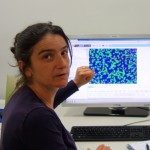Link to Pubmed [PMID] – 30679614
Link to DOI – 10.1038/s41598-018-36944-6
Sci Rep 2019 01; 9(1): 438
The limited success of recent phenotypic anti-leishmanial drug screening campaigns calls for new screening strategies for the discovery of clinically relevant hits. Here we present such a novel strategy based on physiologically relevant, ex vivo biology. We established high content phenotypic assays that combine primary murine macrophages and lesion-derived, virulent L. donovani and L. amazonensis amastigotes, which we applied to validate previously identified, anti-leishmanial hit compounds referred to as ‘GSK Leish-Box’. Together with secondary screens using cultured promastigotes, our pipeline distinguished stage- and/or species-specific compounds, including 20 hits with broad activity at 10 µM against intracellular amastigotes of both viscerotropic and dermotropic Leishmania. Even though the GSK Leish-Box hits were identified by phenotypic screening using THP-1 macrophage-like cells hosting culture-derived L. donovani LdBob parasites, our ex vivo assays only validated anti-leishmanial activity at 10 µM on intra-macrophagic L. donovani for 23 out of the 188 GSK Leish-Box hits. In conclusion, our comparative approach allowed the identification of hits with broad anti-leishmanial activity that represent interesting novel candidates to be tested in animal models. Physiologically more relevant screening approaches such as described here may reduce the very high attrition rate observed during pre-clinical and clinical phases of the drug development process.




